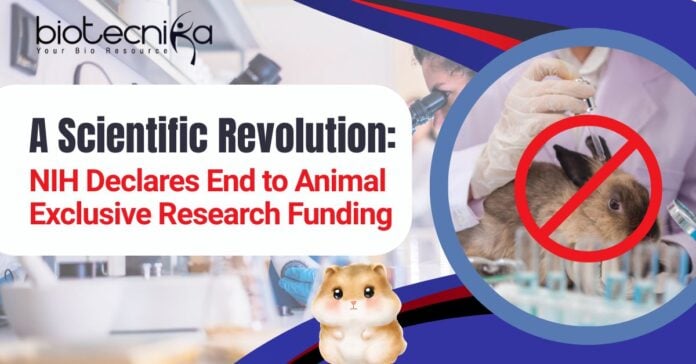NIH Ends Animal-Only Research – to Boost Human-Based Models
The United States National Institutes of Health (NIH) has made a strong announcement. It has also stated that it will no longer prioritize funding proposals that focus exclusively on animal-based research. This bold move aims to promote as well as encourage studies based on Non-Animal Methods (NAMs), such as human-based technologies, organ-on-a-chip systems, computational models, and in vitro tools.
This policy not only elevates the importance of Human-Based Research but also reflects the growing societal and scientific consensus. It also emphasizes and urges the adoption of more accurate, ethical, and cost-effective alternatives. This is widely viewed as a transformative moment for Science and Research.
A Strategic Shift Toward Human Biology
This decision was taken during the inaugural Workshop on Reducing Animal Testing. And it was co-hosted by the NIH and the U.S. Food and Drug Administration (FDA). The workshop mainly aimed to encourage human-relevant research technologies. It also emphasized the need to replace outdated animal models, which have failed to predict human drug responses accurately.
The NIH (National Institutes of Health) reflects a broader shift led by Director Dr. Jay Bhattacharya in April 2025 that committed to replacing traditional Animal Models with Human-Based Technologies. This vision was reinforced at the NIH-FDA (National Institutes of Health and Food and Drug Administration) Workshop on Reducing Animal Testing, where federal leaders explored the long-term adoption of alternatives such as 3D Tissue Models, Organ-On-Chip systems, computational tools, as well as modern Artificial Intelligence-driven methods that more accurately represent human biology.
FDA Calls for a Paradigm Shift in Research Models
The Food and Drug Administration Commissioner, Dr Martin A. Makary, delivered a compelling keynote at the workshop, highlighting the need to reduce the use of animal testing. He explained three main reasons why Non-Animal methods must take centre stage in advanced research.
- Accelerated Drug Development: It is evident that human-relevant models can significantly reduce the time required to develop drugs. It also helps in faster approval of new therapies by providing more accurate predictions of human outcomes.
- Cost Reduction: As we all know, drug development is a multi-billion-dollar process. By adopting modern in vitro and in silico methods, research institutions can significantly reduce costs without compromising safety or efficacy.
- Ethical Responsibility: Society’s expectations are changing, and animal-based research is increasingly seen as a traditional and inhumane practice. Transitioning to alternative methods aligns with contemporary moral standards. As stated by Dr. Makary, the workshop is about reducing Animal Testing in every way we can while safeguarding public health.
His words reflect an urgent call not just for change, but for leadership that is rooted in compassion and responsibility.
A Major Win for Long-Time Advocates
The policy plays major role in organizations like the Physicians Committee for Responsible Medicine, a nonprofit that has spent decades urging federal agencies to shift focus from Animal Experiments to more Human-Based experiments. Through relentless advocacy, public comments, and scientific collaboration, the organization has been at the forefront of this movement.
Their leaders praised the NIH’s (National Institutes of Health) decision as a long-overdue and vital step that aligns public funding with innovation, compassion, and scientific progress. It is also viewed as a powerful signal towards other government agencies as well as private research organizations to reconsider their reliance on Animal-Based research.
The Impact of Dr. Nicole Kleinstreuer
Dr. Nicole Kleinstreuer played a significant role in the development and advocacy of this policy. He is one of the visionary scientists who has spent years advancing the case for Non-Animal technologies. Through her extraordinary works in Toxicology, Biomedical Engineering, as well as Computational Biology
Her leadership has helped institutionalize human-relevant methods, such as:
- Organ-on-chip systems, which simulate the functions of human organs in vitro.
- 3D tissue culture models are used to study disease mechanisms and drug interactions.
- Computational and Artificial intelligence-driven models enable researchers to simulate and predict Human Biological responses with precision.
The NIH Ends Animal-Only Research and no longer encouraging proposals exclusively for Animal Models. Dr. Kleinstreuer confirmed that they are no longer performing any animal-based research. Her contribution is widely seen as pivotal in translating vision into tangible policy.
Building the Foundation for Sustainable Alternatives
This decision is not simply philosophical. It is deeply structural. The NIH is actively creating the foundation to support this Human-Based Research through:
- Policy Reform: This policy provides well-crafted, enforceable guidelines that integrate NAMs (National Academy of Medical Sciences) into research funding frameworks.
- Infrastructure Development: This policy invests in research platforms, technologies, and research training institutes to support the widespread adoption of Non-Animal Methods.
- Strategic Partnerships: Collaborating among industry, academia, and international bodies to ensure consistency and scalability.
By addressing the technical, regulatory, and cultural barriers to adoption, the NIH is working to ensure this change is not temporary, but transformational and lasting.
A Bold Signal to the Scientific
The National Institutes of Health announcement is more than an internal policy update; it’s a message to the advanced scientific and research world. Researchers are now being encouraged, and in many cases required, to adopt Non-Animal methodologies that reflect the Biology of the patients they aim to help.
Dr. Shagun Krishna, a Biomedical Researcher, stated that NIH has made it clear that future research should be not only humane but also scientifically superior. Dr. Makary said that Animals were not born to be tortured. This recognition has touched everyone at the event.
Scientific Integrity Meets Public Good
This policy in a new era of research has shown more accurate, reproducible, and Human-Focused Research.
Non-animal methods have been shown to improve the predictability of disease models. It has revealed clearer insights into drug toxicity. and they support faster clinical translation. All while avoiding the ethical burden of Animal Testing.
This research development is also likely to impact public trust in Science, as the research community moves toward more transparent, compassionate, and forward-thinking practices.
New Research Era
With this decision, NIH has helped the U.S to be a leader in the world’s transition towards Human-Relevant Science and takes initiative to end Animal-Only Research.
Research Organizations, Biotech startups, and the pharmaceutical industry are now expected to adapt their practices. And they have to align their proposals with these new priorities.
As funding for research grows, it favors methods that avoid the use of animals. The incentive to adopt modern technologies will also increase.
This advanced research shift reflects a future where scientific research, ethical responsibility, and patient relevance are no longer mutually exclusive but integrated for better Health outcomes.























